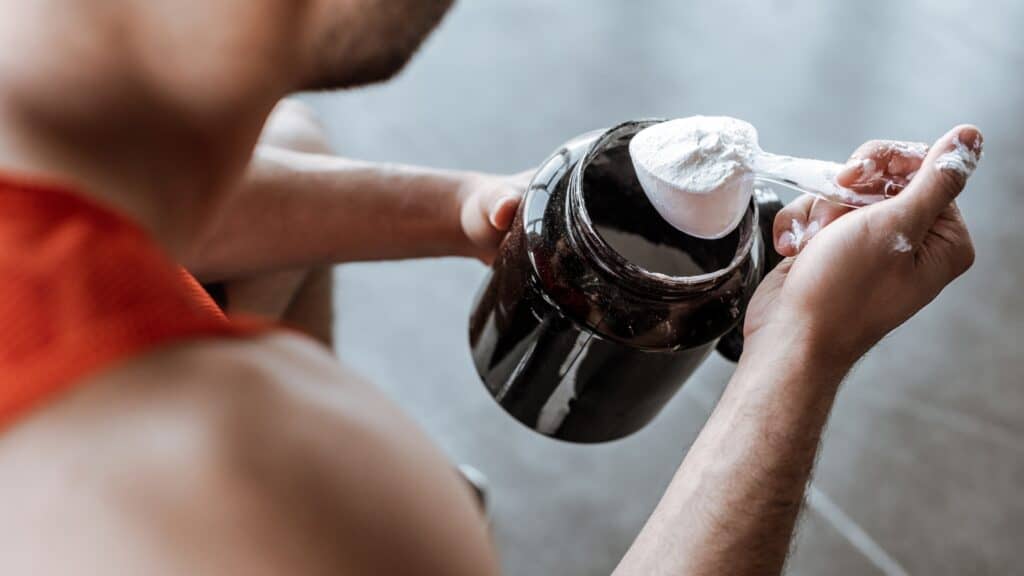As a runner, optimizing your recovery and enhancing performance are paramount to achieving your goals.
In this comprehensive guide, we delve into the transformative effects of protein and creatine supplementation, outlining how these nutrients can accelerate recovery, reduce injury risk, and elevate your running performance to new heights.

Protein: The Ultimate Recovery Tool
If you’re seeking to recover faster, minimize injury risk, and improve your overall running performance, protein is your secret weapon.
By integrating protein into your post-run routine, you can harness its remarkable ability to facilitate muscle repair and growth. Here’s why protein is a game-changer for runners:
- Muscle Repair and Growth: Protein serves as the building block for muscle tissue, playing a crucial role in repairing damage incurred during running sessions. By consuming protein post-run, you provide your body with the essential nutrients needed to rebuild and strengthen muscles, promoting faster recovery and enhanced performance.
- Reduced Fatigue: Incorporating protein into your diet can help alleviate fatigue and promote sustained energy levels. By replenishing glycogen stores and supporting muscle repair, protein consumption can mitigate post-run exhaustion, allowing you to feel more energized and rejuvenated.
- Injury Prevention: Adequate protein intake is associated with improved muscle integrity and resilience, reducing the risk of overuse injuries commonly encountered by runners. By supporting muscle health and function, protein supplementation can safeguard against strains, sprains, and other injuries, keeping you on track with your training regimen.
Navigating Your Protein Requirements
Understanding the role of protein in supporting runners’ performance and recovery is crucial, but determining the precise amount needed can pose a challenge. Research provides valuable insights into establishing optimal protein intake guidelines tailored to individual needs and goals.

Recommended Protein Intake
Research suggests that runners should target an intake of approximately 0.8 grams of protein per pound of body weight, or equivalently, 1.5 grams per kilogram. This recommendation serves as a benchmark for athletes seeking to optimize recovery, enhance muscle repair, and support overall performance.
For instance, let’s consider a 75-kilogram athlete aiming to meet their protein requirements. By applying the recommended guideline of 1.5 grams per kilogram, this individual would require approximately 130 grams of protein per day. Meeting this target ensures adequate nutrient support to facilitate muscle recovery, repair tissue damage, and fuel ongoing training demands effectively.
Individual Variability
It’s essential to recognize that individual factors, including training intensity, duration, and metabolic rate, can influence protein needs. Athletes engaging in high-volume or high-intensity training may benefit from slightly higher protein intake to accommodate increased muscle turnover and repair processes.
Timing and Distribution
In addition to total protein intake, the timing and distribution of protein consumption throughout the day also play a crucial role in optimizing muscle protein synthesis and recovery. Incorporating protein-rich meals and snacks at regular intervals, particularly in the post-exercise window, can enhance nutrient delivery to muscles and promote tissue repair and growth.
Quality Matters
Equally important as quantity is the quality of protein sources consumed. Aim to include a variety of high-quality protein sources in your diet, such as lean meats, poultry, fish, eggs, dairy products, legumes, nuts, and seeds. These sources provide essential amino acids necessary for muscle repair and growth, supporting overall athletic performance and recovery.

Creatine For Runners
In addition to protein, creatine supplementation offers runners a powerful tool for maximizing performance and recovery. Creatine, a naturally occurring compound found in skeletal muscle, plays a vital role in energy production and muscle metabolism. By supplementing with creatine, runners can unlock a host of benefits:
- Immediate Energy: Creatine supplementation ensures a readily available supply of energy to working muscles, enhancing performance and endurance during runs.
- Muscle Repair and Recovery: Creatine supports muscle repair and recovery by providing essential amino acids and promoting protein synthesis. By accelerating the rebuilding process, creatine helps runners recover faster and reduce post-run soreness.
- Strength and Power: Building lean muscle mass and increasing strength are integral to improving running performance. Creatine supplementation can enhance strength gains and power output, enabling runners to tackle challenging workouts with greater ease and efficiency.
Optimizing Creatine Supplementation for Male and Female Runners
While the benefits of creatine supplementation are well-established, it’s essential to tailor your approach based on individual factors, including gender. Research suggests that male and female runners may respond differently to creatine supplementation, requiring nuanced strategies for maximizing its effectiveness. Here’s how male and female runners can optimize their creatine supplementation protocols:
Male Runners:
- Loading Phase: During the initial loading phase, male runners should aim to consume 3-5 grams of creatine per day for a duration of four weeks. This higher dosage is intended to saturate muscle stores efficiently, allowing for enhanced performance and recovery.
- Maintenance Phase: Following the loading phase, male runners can transition to a maintenance dosage of 1-2 grams per day. This lower dosage helps sustain optimal creatine levels in the muscles, supporting continued benefits without the need for excessive supplementation.
Female Runners:
- Loading Phase: Similar to male runners, female athletes should undertake a loading phase consisting of 3-5 grams of creatine per day for four weeks. However, emerging research suggests that female runners may require a longer loading period to fully saturate muscle stores and experience the benefits of creatine supplementation.
- Maintenance Phase: After completing the loading phase, female runners can adjust their dosage to 1-2 grams per day for maintenance. While the daily dosage remains consistent with male runners, female athletes may need to extend the maintenance phase to ensure sustained creatine levels and optimize performance outcomes.

Considerations for Female Athletes
While creatine supplementation offers numerous benefits for both male and female runners, it’s essential to acknowledge potential differences in response and adaptation. Some key considerations for female athletes include:
- Extended Loading Period: Limited research suggests that female runners may require a more prolonged loading phase (beyond four weeks) to achieve optimal muscle saturation and maximize the benefits of creatine supplementation.
- Individual Variability: As with any nutritional intervention, individual responses to creatine supplementation may vary among female athletes. Factors such as body composition, training volume, and hormonal fluctuations can influence the efficacy of supplementation.
- Consultation with Healthcare Provider: Before initiating a creatine supplementation regimen, female runners should consult with a healthcare provider or sports nutritionist to assess individual needs and ensure safe and effective implementation.
By integrating protein and creatine supplementation into your training regimen, you can unlock unparalleled benefits for recovery, performance, and injury prevention as a runner. Whether you’re aiming to recover faster, increase strength, or enhance endurance, these nutrients offer a strategic advantage for achieving your running goals.
With proper supplementation and a balanced training approach, you can elevate your running experience and unlock your full potential on the road or trail.



Comments are closed.